Meridian Explorer 2 USB DAC
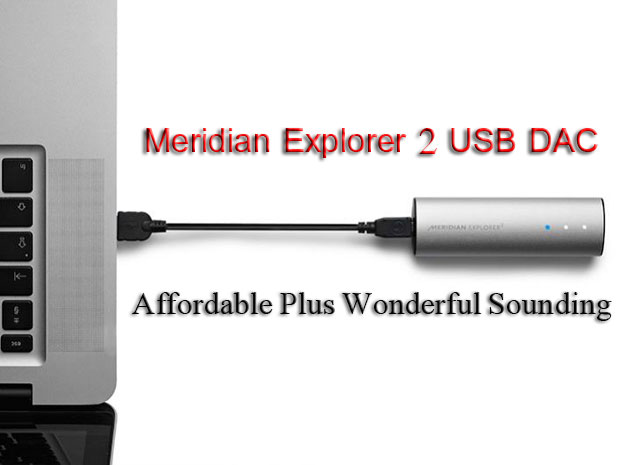
 The Meridian Explorer 2 is a portable USB DAC that will make hi-res fans smile ear to ear. The DAC includes 1 audio input which is a USB2 B socket. Its audio outputs are a 3.5mm analogue line out, fixed 2v RMS and a 3.5mm headphone-level output. Impedance on the headphone jack is impressively low at .47 Ohms.
The Meridian Explorer 2 is a portable USB DAC that will make hi-res fans smile ear to ear. The DAC includes 1 audio input which is a USB2 B socket. Its audio outputs are a 3.5mm analogue line out, fixed 2v RMS and a 3.5mm headphone-level output. Impedance on the headphone jack is impressively low at .47 Ohms.
Meridian pioneered way to process audio information called Master Qualified Authenticated (MQA) that may prove to be technically superior to the MP3, which is convenient but some audiophiles believe lossy compression degrades the listening experience. MQA relies on advances in human auditory perception and delivers lossless sound with lossy compression. As a result, audiophiles can now stream (through services such as Tidal) or download high fidelity studio master tracks but will only use 10% as much data or storage capacity as bulky hi-res files. The LG V30 will be the first smartphone to showcase this technology. In the meantime, audiophiles can listen to MQA-formatted music through their laptop or desktop with the Explorer 2.
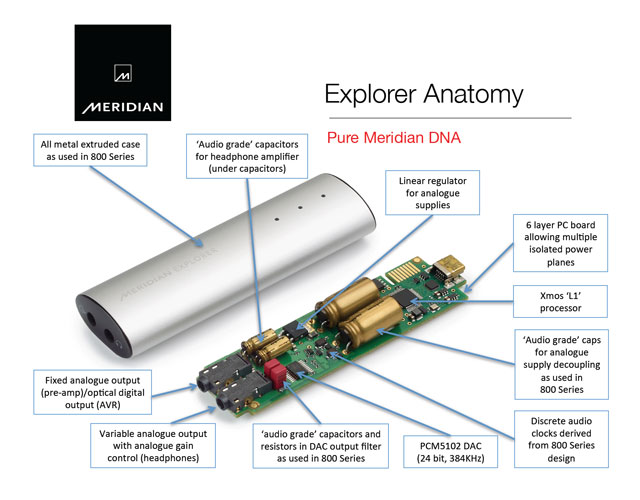
The packaging on the Meridian Explorer 2 is simple and compact. The portable DAC arrives in a slender rectangular box, and the style of the packaging mirrors the item inside – it is high quality, yet minimalistic. This is a pleasing aesthetic for me both in terms of packaging and for the portable DAC itself, and so I was immediately draw to what was inside, based simply on the exterior of the packaging. Within the box, the DAC, mini USB chord, and instructional manuals are firmly situated within a firm cardboard cutout. The packaging is built to last, and I certainly will be keeping it for storage.
The Meridian Explorer 2 has a sleek and lightweight build, without compromising quality or sturdiness. The oblong shaped shell is made of aluminum, and is adorned on both ends with heavy-duty black plastic. A rubber strip lines the bottom, to stop slippage or rolling. This extremely portable device weighs in at just under 2oz. and attaches to the computer or laptop by way of a mini USB cable. There is a headphone jack, as well as a jack to connect to a hi-fi stereo. Since the Explorer 2 runs off the computer power, it does not require connection to an electric outlet, which makes it great for working in various setting, including in cafes or on the go. One aspect to note about this is that the volume control of the Explorer 2 is analogue, and therefore can only be adjusted at the source, meaning at the laptop, computer, etc. I have yet to run into an instance where this is an issue, or where I have even been slightly annoyed by this, but it may be of interest for some.
I decided to test the Meridian DAC paired with the Klipsch X20i In-Ear Headphones. I have reviewed these in-ear headphones very positively in the past, so I knew that I was already working with good gear, and I was curious to hear how the Meridian Explorer 2 would change their sound. First up, I listened to the Lincoln Center Live Sessions recording of Columbian harpist, Edmar Castañeda. In this recording, Castañeda combines the sounds of traditional Colombian folk song with Latin jazz in a solo performance on Columbian harp. To get a baseline, I listened initially to the recording with the Klipsch in-ear headphones plugged directly into my MacBook Pro. Then I listened to the same track with the headphones fed through the Meridian DAC. The difference was immediate, and noticeably improved the quality in several ways. Perhaps most enhanced was the clarity and fullness of bass register. When I listened directly from my computer, I found myself wanting more articulation and more body to the sound in the lowest register of the harp. Castañeda uses this register both in a percussive and in a melodic way. When I plugged into the DAC, I was finally able to hear the percussive moments as having articulation, and was finally able to trace the melody’s form. There is a moment early on in the recording in which Castañeda vertically pulls a string to create a sort of whistle sound. Without the Meridian, I was barely able to pick up on the unusual sound. With the Meridian however, it made me jump out of my skin. In the upper register, the articulation at the head of the notes really pings, and in the middle registers, the fullness of the sound allowed me to track the melodies that before, were getting lost in the very full and rhythmic texture.
 Next I listened to the title song of Castañeda’s latest album, “Double Portion.” The recording is from 2012 and features solo and duo works. In Double Portion,pianist, Gonzalo Rubalcaba, joins Castañeda in a quick-moving back and forth that again, mixes Latin jazz and Columbian folk. A particularly impressive moment for the Meridian Explorer 2 was when, in the quick scalar passages doubled on the two instruments, I was able to hear both timbres completely, and with clarity. Throughout this track, I felt as I was sitting next to the musicians, able to hear their fingers making contact with the strings and keys. I listened this track with the Klipsch plugged directly into my computer, just to make sure it wasn’t wishful thinking, and boy was there a difference! The articulations sounded muted in comparison to having listened through the Meridian.
Next I listened to the title song of Castañeda’s latest album, “Double Portion.” The recording is from 2012 and features solo and duo works. In Double Portion,pianist, Gonzalo Rubalcaba, joins Castañeda in a quick-moving back and forth that again, mixes Latin jazz and Columbian folk. A particularly impressive moment for the Meridian Explorer 2 was when, in the quick scalar passages doubled on the two instruments, I was able to hear both timbres completely, and with clarity. Throughout this track, I felt as I was sitting next to the musicians, able to hear their fingers making contact with the strings and keys. I listened this track with the Klipsch plugged directly into my computer, just to make sure it wasn’t wishful thinking, and boy was there a difference! The articulations sounded muted in comparison to having listened through the Meridian.
 Next I listened to the acclaimed mezzo-soprano, Cecilia Bartoli, in her 2013 studio recording of Casta Diva…Ah bello a me ritorna from Bellini’s opera, Norma. This aria is arguable one of the most definitive of the bel canto style – famous for its soaring and seemingly endless lyricism. As a means of comparison, I initially listened to this recording with LePlus’ Betelgeuse headphones, connected directly to my laptop. Then I listened again to the entire eleven-minute aria with the headphones connected via the Meridian Explorer 2. What is most noticeable in the bel canto style is the breadth of the line, and that is exactly what the Meridian DAC was able to augment and highlight in this recording. Of course Bartoli’s consonants and her scalar ornaments were more clearly distinguished with the DAC versus without it, but what really gave me goose bumps was the way I could trace her lyricism. Because the Meridian picks up on nuances of timbre and motion in the sound, I was able to hear more variety in Bartoli’s line, both in terms of direction and depth. This gave me a better sense of the emotion she that was projecting and overall, helped to create an absolutely riveting and mesmerizing sonic experience.
Next I listened to the acclaimed mezzo-soprano, Cecilia Bartoli, in her 2013 studio recording of Casta Diva…Ah bello a me ritorna from Bellini’s opera, Norma. This aria is arguable one of the most definitive of the bel canto style – famous for its soaring and seemingly endless lyricism. As a means of comparison, I initially listened to this recording with LePlus’ Betelgeuse headphones, connected directly to my laptop. Then I listened again to the entire eleven-minute aria with the headphones connected via the Meridian Explorer 2. What is most noticeable in the bel canto style is the breadth of the line, and that is exactly what the Meridian DAC was able to augment and highlight in this recording. Of course Bartoli’s consonants and her scalar ornaments were more clearly distinguished with the DAC versus without it, but what really gave me goose bumps was the way I could trace her lyricism. Because the Meridian picks up on nuances of timbre and motion in the sound, I was able to hear more variety in Bartoli’s line, both in terms of direction and depth. This gave me a better sense of the emotion she that was projecting and overall, helped to create an absolutely riveting and mesmerizing sonic experience.
The Meridian Explorer 2 is a small but powerful tool that can enhance any listening experience. At a very reasonable price point, this portable DAC can be paired with speakers, headphones or ear buds and will augment the quality in terms of clarity, timbral nuance, and depth of sound. Knowing this, if in the future I decide to upgrade my speakers or my headphones, I know I will surely keep the Meridian Explorer 2 around indefinitely to enhance whatever new system I may grow into. I heartily recommend the Meridian Explorer 2 to any audiophile wanting to maximize the quality of his or her current or future systems.


mark abell
Specifications:
Price: $300.00
Website: https://www.meridian-audio.com/en/products/dacs/usb-dacs/explorer/)
Stereo Times Masthead
Publisher/Founder
Clement Perry
Editor
Dave Thomas
Senior Editors
Frank Alles, Mike Girardi, Key Kim, Russell Lichter, Terry London, Moreno Mitchell, Paul Szabady, Bill Wells, Mike Wright, Stephen Yan, and Rob Dockery
Current Contributors
David Abramson, Tim Barrall, Dave Allison, Ron Cook, Lewis Dardick, Dan Secula, Don Shaulis, Greg Simmons, Eric Teh, Greg Voth, Richard Willie, Ed Van Winkle, and Rob Dockery
Music Reviewers:
Carlos Sanchez, John Jonczyk, John Sprung and Russell Lichter
Site Management Clement Perry
Ad Designer: Martin Perry


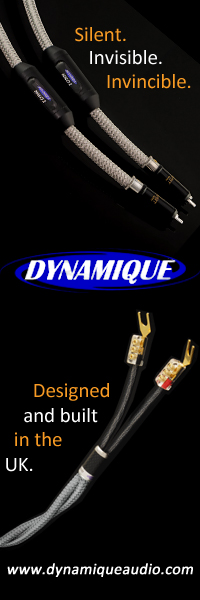
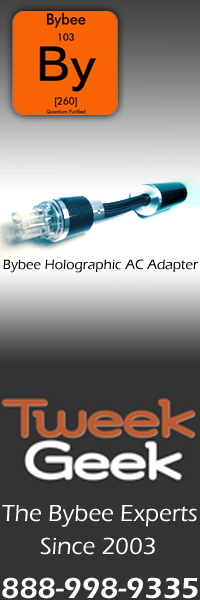
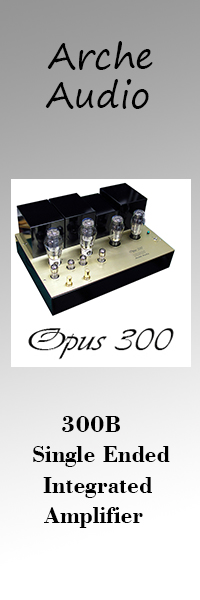
Be the first to comment on: Meridian Explorer 2 USB DAC